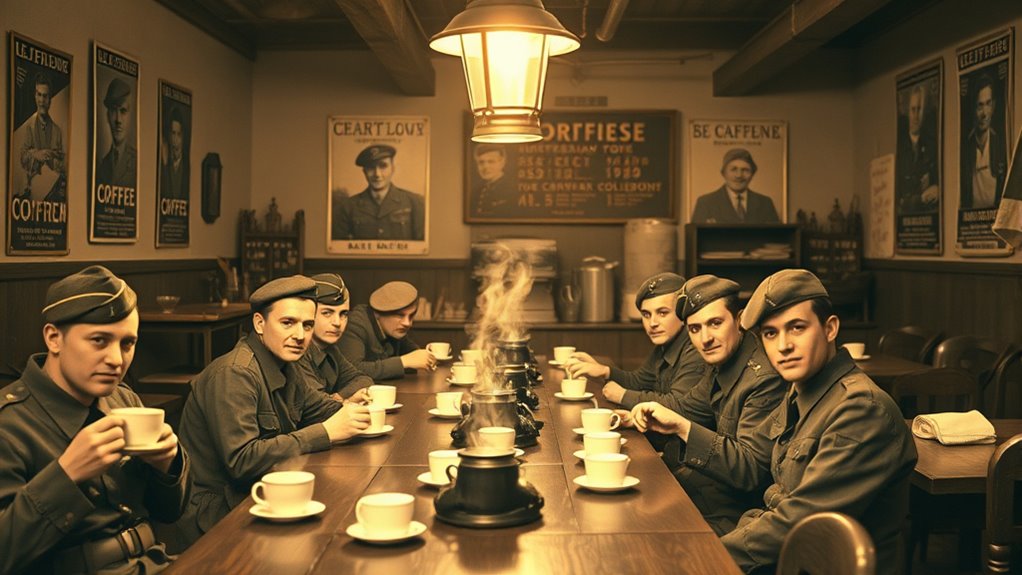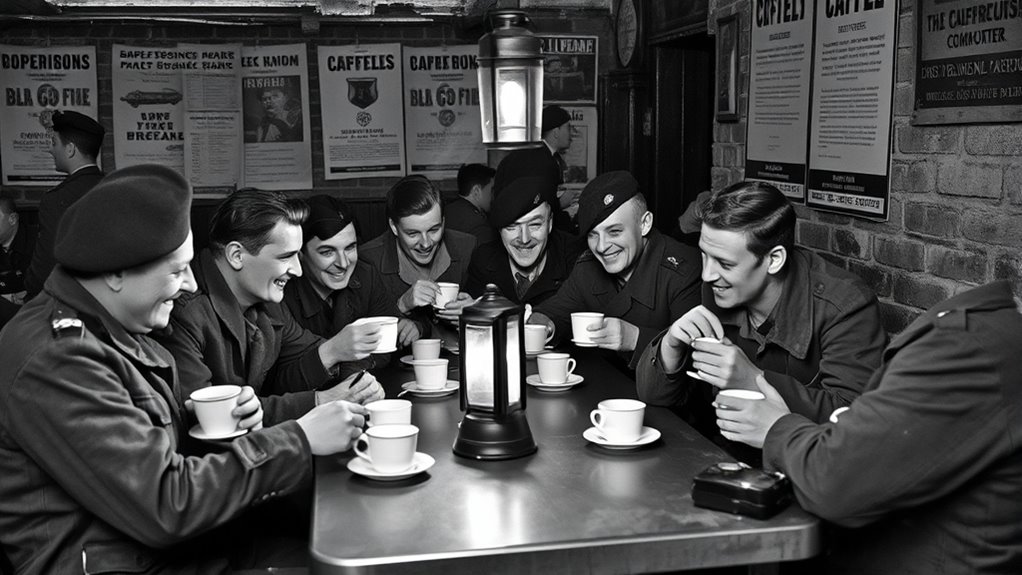During the world wars, coffee played a vital role in boosting soldier morale by providing a comforting and energizing boost amidst harsh conditions and rationing. Instant coffee and innovative brewing equipment made it easy to prepare on the front lines, helping soldiers stay alert and connected to home. It also symbolized resilience and normalcy during chaos. If you want to discover more about how coffee impacted wartime lives, there’s plenty more to explore.
Key Takeaways
- Coffee boosted soldier morale and alertness by providing warmth and comfort during wartime hardships.
- Instant coffee and brewing innovations enabled quick, reliable caffeine access behind enemy lines.
- Coffee supplies were rationed, leading to substitutes like chicory and soybeans to sustain morale.
- Portable equipment and coffee tablets facilitated easy brewing in field conditions during WWII.
- Coffee became a symbol of resilience, normalcy, and emotional support amid the chaos of the wars.

Coffee played an essential role in both World War I and World War II by boosting the morale of soldiers on the front lines. During World War I, the U.S. military recognized how crucial a hot beverage could be for soldiers enduring harsh conditions. They supplied up to 37,000 pounds of instant coffee daily, ensuring troops had a quick and reliable source of caffeine. Instant coffee became a symbol of wartime comfort because it was easy to prepare behind enemy lines and in field conditions. Soldiers often brewed it using portable equipment, calling their favorite brew “cups of George,” which became a morale booster amidst chaos.
During WWI, instant coffee was vital for morale, providing soldiers with quick, comforting caffeine behind enemy lines.
The widespread adoption of instant coffee reflected how the coffee industry adapted to wartime needs, supporting soldiers’ spirits and maintaining their alertness during long, grueling campaigns. Coffee served as more than just a stimulant; it offered a sense of normalcy and comfort during turbulent times.
In World War II, the importance of coffee grew even more. The U.S. government and military invested heavily in instant coffee, purchasing over a million cases annually to meet the high demand of soldiers. Coffee tablets and specialized equipment made brewing quick and efficient, even on the front lines. The development of coffee tablets further exemplified how innovation was driven by wartime needs to ensure soldiers’ comfort and caffeine intake.
Yet, wartime coffee supply faced challenges—coffee rationing became common, especially for civilians. Rationing limited civilians to less than a cup daily, and substitutes like chicory and soybeans were promoted to stretch supplies. Despite shortages, soldiers still relied on their coffee tablets and instant coffee packs, which provided a consistent and reliable source of caffeine amid shortages and logistical hurdles.
Coffee became a symbol of resilience, and maintaining morale through familiar routines was a priority for military leadership. The coffee industry responded to wartime needs by innovating and scaling production. Instant coffee’s portability, ease of use, and long shelf life made it indispensable for troops.
It’s not just about caffeine; it’s about providing soldiers with a semblance of normal life and comfort amid chaos. Whether brewed behind enemy lines or during long marches, coffee helped soldiers stay alert, motivated, and connected to a sense of home.
Its role in both wars highlights how a simple beverage can profoundly impact morale, supporting soldiers physically and emotionally. From coffee tablets to rationing policies, coffee’s presence in wartime history underscores its importance as a symbol of resilience and wartime comfort.
Frequently Asked Questions
What Was Coffee Used for in WWII?
You might wonder what coffee was used for during WWII. Well, it was crucial for boosting morale and maintaining energy for both civilians and soldiers.
The military provided instant coffee, called “a cup of George,” often brewed behind enemy lines. Coffee tablets with caffeine and vitamins helped keep soldiers alert.
Since alcohol was banned on ships, coffee became the strongest legal drink, essential for endurance and focus.
Why Was Coffee so Important to Soldiers?
You see, coffee was vital to soldiers because it kept you alert and energized during long, taxing hours. It served as a morale booster, giving you a sense of normalcy and comfort amid chaos.
When you drank coffee, you felt connected to home, boosting your courage and resilience. Its stimulating effects helped you stay awake during watches and battles, making it an essential part of your wartime experience.
What Role Did Coffee Play in History?
You see, coffee played a significant role throughout history by fueling innovation, shaping social interactions, and boosting morale. It became a symbol of comfort and resilience during tough times, especially in wartime.
People used it to stay alert, connect with others, and maintain a sense of normalcy amid chaos. Its cultural impact influenced daily routines, social spaces, and even wartime tactics, making it an essential part of history’s story.
Did WW1 Soldiers Drink Coffee?
Yes, during WWI, soldiers drank coffee regularly. You’d find them brewing it behind the lines, calling their drinks “cups of George.”
The U.S. military supplied massive amounts of instant coffee—up to 37,000 pounds daily at peak times—to keep troops energized and boost morale.
Personal stories show how important coffee was for soldiers’ daily routines, helping them stay alert and connected amid the chaos of war.
Conclusion
As you can see, coffee played a crucial role in supporting soldiers and boosting morale during the world wars. It kept troops alert, fostered camaraderie, and provided a comforting taste of home amidst chaos. By fueling resilience and camaraderie, coffee proved to be more than just a beverage—it became a essential part of wartime survival. So next time you sip your coffee, remember its powerful history and the way it helped shape wartime experiences.









